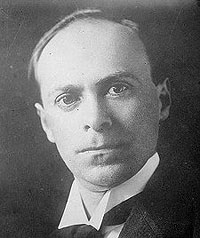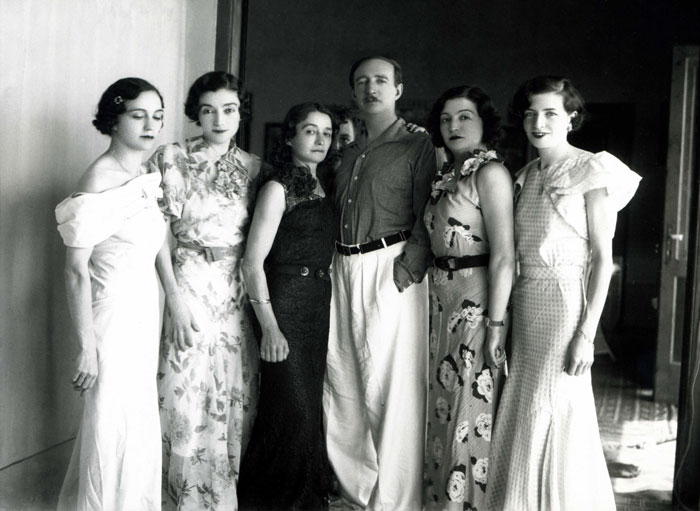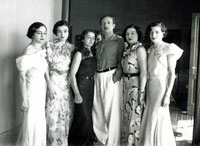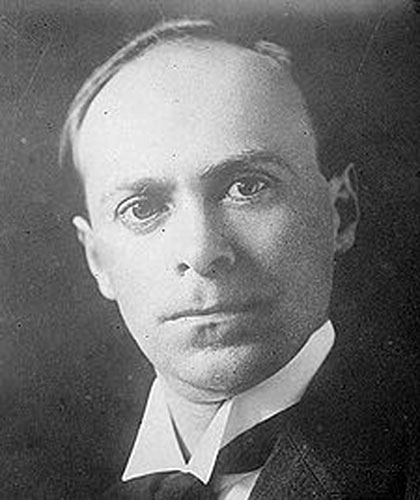| | Robert Elsie | AL Art | AL History | AL Language | AL Literature | AL Photography | Contact | |
Robert Elsie
Texts and Documents of Albanian History
BACK | AL History

![]()
Herman Bernstein
1934
Herman Bernstein:
Little Albania is the Pawn
in a Great Diplomatic GameHerman Bernstein (1876-1935) was the United States Ambassador to Albania from February 1930 to September 1933, a period marked by Albania’s struggle under King Zog to maintain its independence between Italy and Yugoslavia. Bernstein was born in Neustadt-Schirwindt, now Kudirkos Naumiestis in Lithuania, of a Jewish family and emigrated to the United States in 1893. There he worked as a journalist, writer and translator (of Russian literature), contributing material to “The New York Evening Post,” “The Nation” and “The Independent.” He was editor of “The Jewish Tribune” and the “Jewish Daily Bulletin,” and travelled to Europe as correspondent of “The New York Times,” where he documented the situation of the Jews in eastern Europe and covered the Russian Revolution for the “New York Herald.” Bernstein met Herbert Hoover at the Paris Peace Conference in 1919 and supported the latter’s bid for the presidency in 1928. In return, Hoover appointed him ambassador to Albania. Bernstein died in Sheffield, Massachusetts. His archives, including some writings on Albania are preserved at the YIVO Institute for Jewish Research in New York.
Herman Bernstein was on good terms with King Zog. In the following article, published in the “New York Times,” he throws light on Albania’s predicament in juggling her relations between Italy, Yugoslavia and Greece.
Her affairs at a crisis, Albania watches keenly the various moves made by the blocs that are led by France and Italy.
Albania is regarded as one of the most serious danger zones in Europe. A new war may start there if the political and military interests of other nations in Albania continue to conflict with one another. Because of her geographical position, this little country holds the key to the Adriatic and has been the bone of contention among various nations for centuries.
From a strategic point of view her coast line would be of inestimable value to Italy in the event of war. Italy has been pouring vast sums into Albania for some years to help organize the army, to build roads, bridges and fortifications. In the Balkans it is believed that Italy’s effort to militarize Albania is part of the program of the imperialist ambition, accredited to Mussolini, to penetrate the Balkans, to reconquer the famous Roman Via Ignatia leading through Albania and Yugoslavia to Saloniki and Istanbul.
Italy’s every move in Albania is watched with suspicion and apprehension by France, by the Little Entente and particularly by Yugoslavia. During the past few years the financial aid and military guidance furnished by Italy to Albania have served to intensify the feeling of nervousness in the Balkans and have caused Yugoslavia to make feverish military preparations to combat the feared Italian penetration of the Balkans.
A Pawn of the Powers
Little Albania has thus become a pawn in the game of the two conflicting blocs in European diplomacy, one headed by Italy and the other by France. She has profited to a certain extent by this conflict of interests and has succeeded in strengthening her national unity, first with the help of Yugoslavia and then with the help of Italy. Whatever the hidden motives of these nations may have been, Albania has skillfully and courageously guarded her independence, even though she was forced to make numerous sacrifices, concessions and compromises in return for the material help she obtained since the end of the war. Whether or not the roads and bridges built with the aid of Italian money were intended for Italy’s military schemes, they now serve useful economic purposes for Albania, having established normal communications between the various parts of the mountainous little country.
Invaded During World War
During the war Albania was the scene of many invasions. Greek, Serbian, French, Austrian and Italian armies fought one another in Albania, and the little land was split into several zones under foreign influence, while the people were subjected to unspeakable privations and misery. Ahmed Zog, the present King, was interned in Vienna for the period of the war. Albania’s independence, proclaimed in 1912, was interrupted. At the peace conference in Paris her claims were at first completely ignored. The Albanian peace delegates, headed by Mehmed Bey Konitza, brother of the present Albanian Minister to the United States, placed their hope in President Wilson, and appealed to the American peace delegation that the United States, as a disinterested power, take over the mandate for Albania.
Yugoslavia, Greece and Italy were eager to secure their own “spheres of influence.” In 1919 an agreement was reached by Clemenceau, Lloyd George and Nitti, in the absence of the American representative, giving the mandate over Albania to Italy, under the League of Nations, and ceding part of Northern Albania to Yugoslavia. The Albanians protested against the imposed settlement which was to deprive them of independence and partition their country.
Wilson’s Protest
President Wilson objected vigorously to the agreement on the ground that it had been reached in the absence of the American representative and that it tended to “partition the Albanians, against their vehement protests, among three different alien powers.”
Albania’s independence was saved when the American Government declared that “Albanian questions should not be included in the proposed joint discussion of Italy and Yugoslavia, and the President must reaffirm that he cannot possibly approve of any plan which assigns to Yugoslavia in the northern districts of Albania territorial compensation for what she is deprived of elsewhere...” And that “Italy and Yugoslavia were left to settle their differences, if they could, by separate negotiations, with the proviso that they must not come to terms at the expense of Albania.”
Albania was admitted as a full-fledged member of the League of Nations in December, 1920, after a dramatic plea in behalf of Albanian independence by Lord Robert Cecil, in the face of protests made by some of the Balkan States.
A year later the Ambassadors of Great Britain, France, Italy and Japan, “recognizing that the violation of these frontiers or of the independence of Albania might constitute a danger for the strategic safety of Italy,” concluded an arrangement to the effect that “if Albania should at any time find it impossible to maintain her territorial integrity, she shall be free to address a request to the Council of the League of Nations for foreign assistance”; that “the governments of the British Empire, France, Italy and Japan decide that, in the above-mentioned event, they will instruct their representatives on the Council of the League of Nations to recommend that the restoration of the territorial frontiers of Albania should be entrusted to Italy.”
Though already a member of the League of Nations, Albania was not even consulted regarding this agreement. She protested against it, declaring that she would not recognize its validity. To this day Italy regards the Ambassadors’ Agreement as a binding international instrument which recognizes her special interests in Albania, but the pact is regarded with suspicion and fear by Albania’s immediate neighbors in the Balkans; the agreement has thus served as a cause of friction ever since and has made Albania the sensitive zone it is today.
In 1920 the Italians still occupied Valona, in Southern Albania. The Albanian leaders, determined to liberate their country from foreign domination, forced the Italian Army to withdraw. Then they commenced to organize the State and to establish order in the land. Ahmed Zog was one of the outstanding young leaders, and the government in which he was Minister of the Interior and then Premier became identified by his name. In 1924 the Zog regime was overthrown by a revolution led by the Albanian Bishop, Fan Noli. Ahmed Zog, with several of his colleagues, hurried to Belgrade for shelter and aid. The Fan Noli revolutionary government lasted from June till December, 1924, when Zog, whom it had sentenced to death, returned victoriously to Tirana at the head of a small army which he had organized in Yugoslavia.
Within a month after his return to Albania, Zog was elected President of the Albanian Republic for seven years. His government began to reorganize and modernize the country. But outbreaks of discontent kept occurring from time to time. The Yugoslavs, having befriended Ahmed Zog and helped him to regain power, expected him to adopt a strongly pro-Yugoslav, or rather anti-Italian, orientation. Realizing the grave danger for his country in such a policy, President Zog endeavored to steer a middle course, to be pro-Albanian.
The Pact of Tirana
Suddenly, in 1926, a serious uprising took place in Northern Albania. Ahmed Zog was convinced that it had been instigated by Yugoslavia. Both Italy and Yugoslavia had proposed to him a pact of friendship and security. That uprising caused him to make a quick decision in favor of Italy, and on Nov. 27, 1926, he signed a five-year pact of friendship and security between Albania and Italy.
This document, known as the Pact of Tirana, stated that Italy and Albania, “with a view to re-enforcing their mutual relations of friendship and security... recognize that any disturbance directed against the political, juridical and territorial status quo of Albania is opposed to their reciprocal interest.”
The signing of the Pact of Tirana threw Albania’s neighbors into a state of consternation and alarm. A year later, shortly after the signing of the Franco-Yugoslav Treaty, a treaty of alliance between Italy and Albania was concluded, for a period of twenty years. A loan of 50,000,000 gold francs was granted to Albania by Italy, through an Italian financial group known as the SVEA. The National Bank of Albania was established under the supervision of this group. A large program of public works was initiated and financed by this loan, Italian economic organizers, engineers and contractors came to Albania. Italian military organizers and instructors arrived. Roads, bridges and public buildings were constructed.
Every move in the Balkans is scrutinized as under a microscope. The Yugoslavs watched the efforts of the Italians in Albania with suspicion. They regarded the Italo-Albanian treaties, the loan, and the influx of Italian organizers and instructors as part of a political and military scheme to secure a stronghold on the Adriatic, with the aim of penetrating the Balkans. Belgrade regarded such a program as a direct challenge to Yugoslavia. The situation was dangerous.
On Sept. 1, 1928, President Zog was proclaimed King of the Albanians by a Constituent Assembly, and the republic became a kingdom. The Italian general, Alberto Pariani, helped to organize and train the Albanian Army. The gendarmerie was organized and directed by the British general, Sir Jocelyn Percy. The courts of justice were reorganized. New schools were opened. A faster tempo was introduced in this little country where in the past “things could be accomplished only if you had enough tobacco and patience.”
When the five-year period of the Pact of Friendship and Security expired, King Zog declined to renew it, notwithstanding the reported pressure brought by Mussolini. King Zog maintained that the treaty was no longer necessary, as he required no outside power to protect him. He also pointed out that his treaty of alliance with Italy, which would remain in force for a number of years, covered all the points regarding cordial collaboration between the two nations.
Critical Financial Situation
In the meantime the economic and financial condition of Albania had reached a critical stage. Italy offered to help Albania again by granting ten annual loans of 10,000,000 gold francs each. Albania’s neighbors grew alarmed, believing Italy’s proposal to be nothing else than a new subvention for military purposes. The annual loans were to be expended under the supervision of a mixed commission of Albanians and Italians. Albania accepted and the first two annual loans were made, though not in full. The third annual loan, this year, was withheld on the ground that Albania was not fulfilling the terms of the agreement concerning “cordial collaboration.”
When Italy hinted to King Zog, about a year ago, that a customs-union between Italy and Albania would be agreeable to Italy and would prove of great advantage to Albania, King Zog rejected the suggestion, realizing that such an agreement would not only irritate his Balkan neighbors, but that it might also create a stir throughout Europe.
King Zog and his sisters
(Photo: Marubbi, 1936)
Then Italy became irritated by a sudden amendment in the Albanian Constitution which led to the closing of some foreign and parochial schools. The Albanian Government explained that this measure was needed at present in order to consolidate the national unity through the public school system, and to prevent foreign anti-nationalist propaganda. The Italians refused to admit such administrative directors in their schools. They closed their schools and sent their instructors back to Italy. The wisdom of Albania’s new law regarding its school system was questionable, in view of the present scarcity of trained Albanian educators.
No More Help From Italy
The Italian Government, knowing well Albania’s desperate financial condition, adopted a policy of watchful waiting, declining all further financial aid. Italy’s imports from Albania kept going down. The Italians denied that they desired any new concessions in Albania, that they wanted control of the army, of the gendarmerie, or of other branches of the government. They said that all they wanted was friendship, cordial collaboration, and cultural influence.
King Zog declined to reopen the schools, but made a gesture of good-will by ordering that the Italian language should be made obligatory in the Albanian secondary schools. This did not quite satisfy the Italians and they kept delaying the promised annual loan. Then King Zog ordered a drastic reduction in the 1934 budget. He reduced the army expenditures by almost one-half. He also presented the State with one-fourth of his salary and of his royal household expenditures for this year. All this helped to increase King Zog’s popularity among the Albanians, but Rome was still angry.
The Present Problem
Albania, knowing well that her only hope for rehabilitation lies in peaceful development, is endeavoring to extricate herself from political entanglements which jeopardize her friendly relations with her Balkan neighbors. Italy and Yugoslavia and Greece have repeatedly declared that they were opposed to the violation of Albania’s independence.
Meanwhile the diplomatic battle of wits between Premier Mussolini and King Zog is continuing. Thus far King Zog seems to have been victorious, for the reason that Albania’s strength lies in her weakness. She has recently concluded a favorable commercial treaty with Greece, and is now negotiating a new commercial treaty with Yugoslavia. These are unmistakable symptoms of a closer cooperation between Albania and her Balkan neighbors.
If Albania succeeds in establishing cordial relations with her Balkan neighbor without incurring the enmity of Mussolini, the little country on the Adriatic, called “Europe’s Forgotten Land,” will be in position to develop peacefully and successfully her potential agricultural and economic possibilities.
[Published in: The New York Times, New York, 28 January 1934.]
TOP


